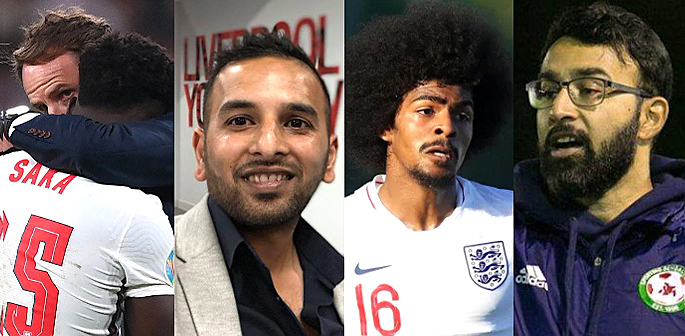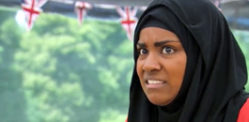"Fix up lad, you're not playing cricket here."
Racism linking back to the England football team and the sport as a whole in the country is nothing new.
In fact, racism has seen a further escalation, following England’s Euro 2021 loss to Italy.
Has anything been done about this issue? Whilst efforts have been made, the desired results have not always come about.
Ever since the early 90s heading into the millennium, at times, it seems there has been more talk, with less productive action.
It is as if the most influential keep going back to the drawing board in terms of thinking and implementation.
From a football perspective, Marcus Rashford, Jadon Sancho and Bukayo Saka should never have taken those penalties against Italy in the Euro 2021 final.
Rashhford hardly had any playing time in the final, with the other two not being penalty specialists.
Regardless, post-match the online hatred shown towards them by some home fans was uncalled for and unjustified.
History suggests these three football players are not alone.
Many former England football players such as John Barnes, Luther Blissett, and Paul Parker have all had an experience of racism in England.
Racism at the grassroots level also remains quite bad, with many believing it to be the epicentre of it all.
Concerning what has happened, we reflect and delve further into the England football racism debate, with exclusive reactions from two prominent individuals working across diverse communities.
Reflection and Conversation
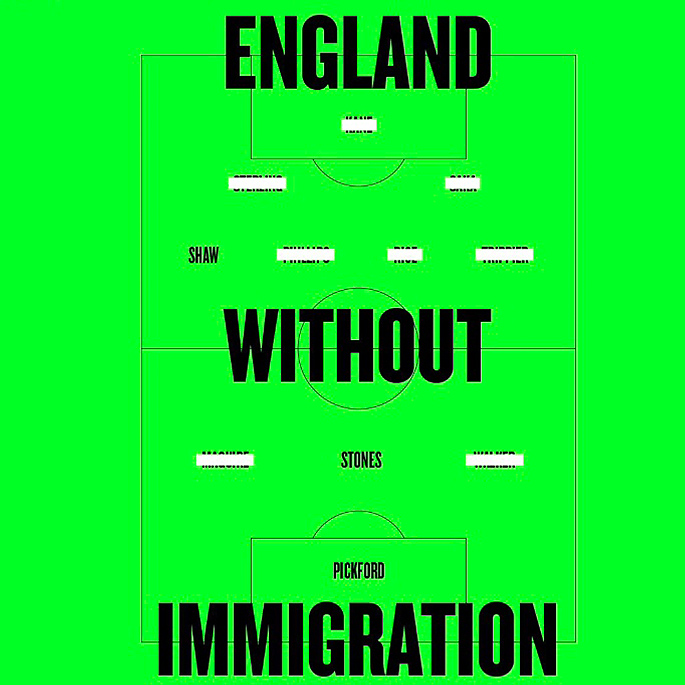
The racism of the Euro 2021 final was just another reminder of how big the problem is within the sport. The nucleus of it extends very much to supporters and others.
It was shocking for many to see some of the reactions from supporters living in England.
Most of the abuse hurled from English supporters has come online by so-called keyboard warriors.
Posts like “Go back to Nigeria” and “Get out of my country “also bring up issues relating to immigration, national identity and what constitutes being “English.”
These derogatory and vile posts imply people of colour do not belong to England and have no right to live in the country.
Such attitudes highlight that the celebration of Englishness has a connection with the marginalisation of ethnic minorities and social liberals.
This also ties in with a culture of football, which relates to hooliganism.
What was more disturbing, is that such people are posting these comments, hiding behind fake accounts.
Were these supporters missing a key point here? And that is without immigration, the England football team may not have got to the Euros final.
The Migration Museum presents a stark reality, in that only three players in the starting XI were fully English.
Thus, the final playing XI of the England football team was reflecting diversity.
Imrul Gazi, manager of Sporting Bengal did not find the backlash against the three players surprising.
When looking back, at the time he was concerned for all the Black players who were stepping up to take a penalty:
“The first thing I said, when It came to the penalties, was that I hope none of the Black players miss a penalty.”
When probed further and what let him to this fear, Imrul gave a similar example:
“In non-league football, I’ve heard you wouldn’t want a coloured person, black person or an Asian person taking a penalty under pressure.”
Despite what happened, Imrul says it is encouraging to note that around “80 %” of England’s population “feel for the three lads that missed the penalties.”
Humayun Islam BEM, CEO of BEAP Community Partnership, believes one cannot judge a player missing a penalty based on their skin colour. In fact, he stresses on the wider issue:
“A penalty miss by any individual, irrespective of background does not define a player.”
“This is a problem, which goes beyond football and is a societal issue.”
However, the racist abuse towards the players was not just a knee jerk reaction, but a hardline expression of “Them” versus “Us”, linking to immigration and superiority.
Hypocrisy and Undue Accountability
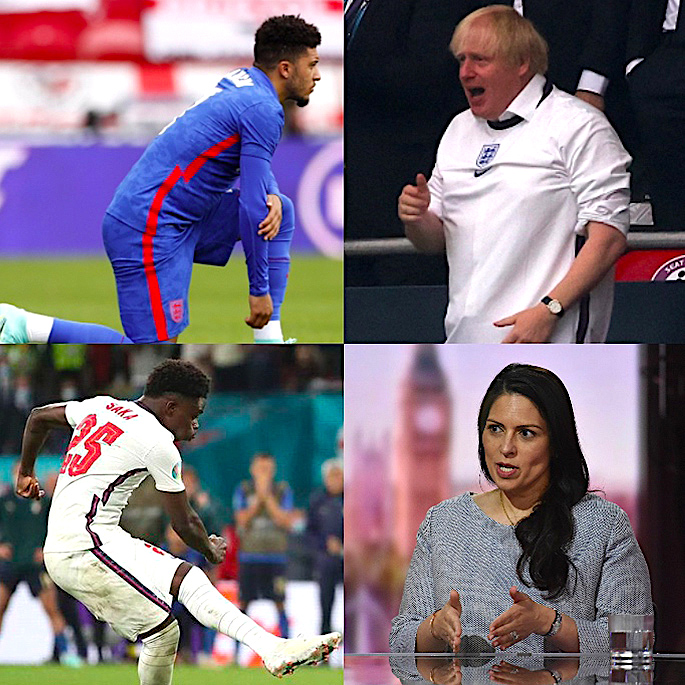
It has become obvious, that Black players are heroes when they perform for England.
However, after the trio went onto miss their penalties, they were made scapegoats, with some holding them accountable.
Individuals making racist comments do not acknowledge the bravery of these young players but are quick to point their mistakes.
And of course, the skin colour of these players had instantly put them in the firing line. Imrul Gazi reflects on this bitter truth, saying:
“Whether you’re black, white or brown, your colour goes out of the window when you’re winning for England.
“And when you’re losing, suddenly some of the true colours from the nation emerge.”
It is very normal in such circumstances to play the race-based hypocrisy card. Equally, the political condemnation of football racism is also hypocritical.
What was the British government expecting, especially after refusing to condemn the booing of footballers who had shown the knee gesture?
Did this silence contribute to the toxic atmosphere, post-match? Naturally, to a large extent, it did, as well as other factors coming into effect.
Prime Minister Boris Johnson once made a comparison of Muslim women with letterboxes.
In contrast, he eventually came to the defence of the three players, terming the abuse towards them as “appalling.”
He also said racist fans attacking the footballers should be “ashamed of themselves. “
But it felt too little too late from the honourable Prime Minister. Similarly, Home Secretary Priti Patel went on Twitter to “condemn the violent minority who assaulted” the footballers.
Though, in the past, she described the Black Lives Matter protests as “dreadful.” Such varied comments from the UK leadership are misleading and a clear form of double standards.
Thus, it was inevitable that such racists attacks were likely to happen against the players from the England football team
What if Desi Players had Missed Penalties?
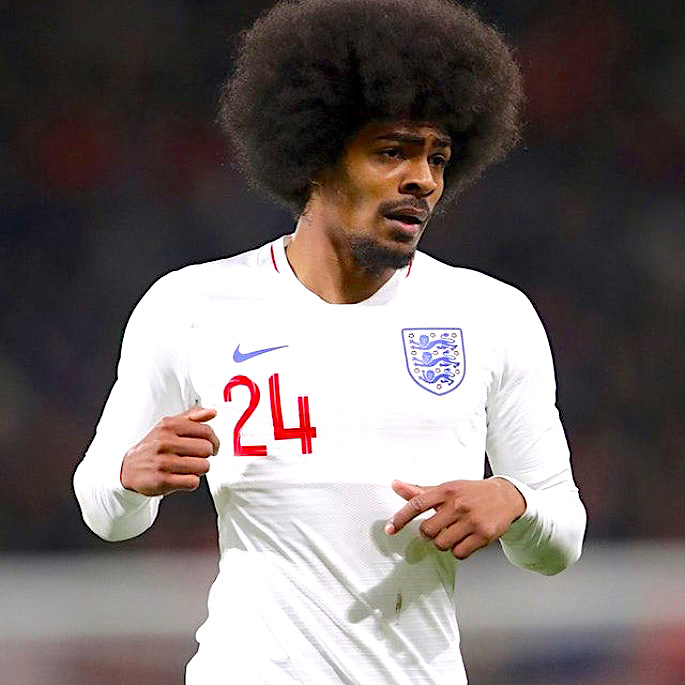
Even though no British-Asian player has ever represented the senior England football team, one can only imagine what they might have endured.
Imrul Gazi acknowledges that had an Asian footballer missed the penalty, the racial angle would have been much more:
“For example, if Hamza Choudhury was playing on that day and missed a penalty, the reaction would be ten times worse.”
In an ideal world, there should be no differentiation of Black, White or Asian players.
However, had Yan Dhanda or Danny Batth missed a penalty, the scenario would not have changed, but the abuse may have taken another level.
Humayun Islam agrees that had it been a Desi player, the abuse would have turned into an ugly form of racism.” Elaborating on this further, he says:
“I think there would have been all sorts of unpleasant hashtags with some being quite obvious.”
According to Humayun the “psyche” behind this is that Black players are accepted in football more than players from a South Asian background.
As a result, Humayun mentions that Desi players in a similar situation would face a lot more racism.
He also believes a Desi supporter would possibly be subject to physical attacks, especially if they were wearing a three lions top.
In respect to this, he provides an example of a potential racist chant:
“Take this off. This is not representing you.”
He also went on to state that Desi players would have faced much more “verbal abuse” too.
Taking into account England football racism, and the continuing after-effects of colonialism, things would have become tense for Desi players in such a situation.
The Crux of Football Racism and Initiatives
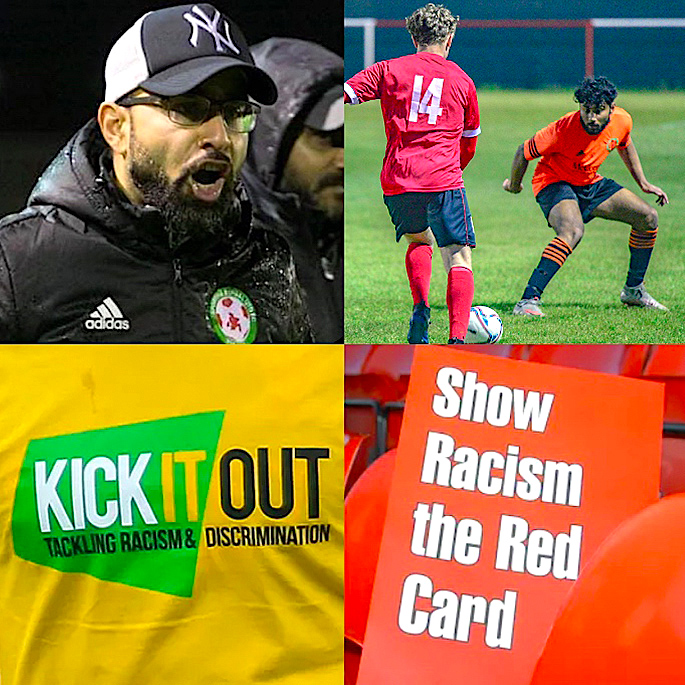
It is important to dig further and see where the root for such aggressive racism lies.
Whilst players have experienced racism and prejudice as professionals, it is far deeper at the grassroots level.
Imrul Gazi agrees that it all starts at the grassroots level, with historically typical stereotypes resurfacing:
“If you go to a normal Sunday league game, you’re going to hear the standard stuff that Black players are not intelligent or smart enough.”
He adds the situation for Desi players is much more “hard” and “difficult” with racist slurs intensifying.
He says an all Asian team competing on a football pitch is often seen as a “walk in the park.” In other words, there are negative connotations towards Desi players right from the grassroots level.
According to Imrul, certain English people also continue to perceive Asian footballers as “weak.”
Imrul mentions one of his top players accidentally took a throwing instead of a free-kick. In response, a substitute player on the bench from the opposing side shouted:
“Fix up lad, you’re not playing cricket here.”
Imrul also tells us that some of the non-Asian players who came to Sporting Bengal have actually witnessed the race card and the bias against Asian players.
He describes this as an “extra obstacle” to go with other matters on the pitch, as well as the “bureaucracy” that goes with it.
Even though schemes such as Kick it Out and Show the Racism Card have succeeded to a degree, not much has changed.
Many ex-footballers have felt these campaigns are more like ticking that box, with the likes of Rio Ferdinand once refusing to wear the Kick It Out t-Shirt.
Academies of big clubs are running courses and educating everyone related to football.
However, Portsmouth football club is investigating academy players allegedly sending racist messages following England’s loss to Italy.
Many questions arise from all of this. Is the Football Association (FA) doing enough work with grassroots football?
Do professional bodies and Kick It Out really care about grassroots and what’s going on? How much money is trickling down at the grassroots level?
Unfortunately, nothing will change drastically, until things come from the top. After all, they are the ones who have the financial capacity.
Sadly, all the money is being injected into the Premier League.
Surely, more can be done at the grassroots level to educate everyone.
Measures and Problem-Solving
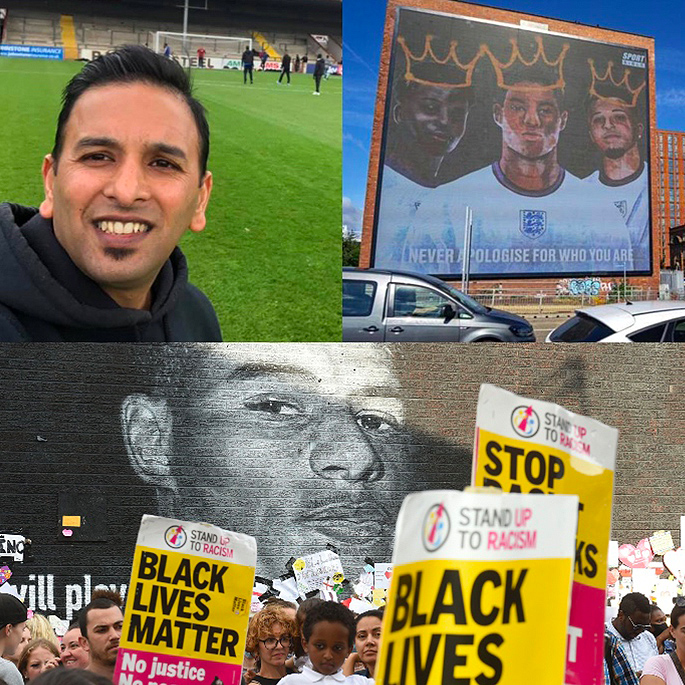
The government is cracking down on racial abuse and hate crime, with several arrests being made and so forth.
However, arrests and hefty fines won’t be sufficient to combat racism in football.
Banning racist people to attend football matches alone will also not fully eradicate or get rid of football racism.
Social media, particularly online abuse is a major talking point. This area needs more attention and focus, especially when it comes to regulating content.
Many of the leading platforms can also be more stringent in terms of verification. This becomes even more important when new people want to join.
Verifying might take some time, but it is an avenue worth exploring. People might be reluctant to share any personal data.
In that case, it might be worth introducing a fingerprint system biometrics.
Following the Euro 2021 miss, despite realising that he would be a target of racial abuse, even Bukayo Saka felt social media platforms could do more:
“I knew instantly the kind of hate that I was about to receive and that is a sad reality that your powerful platforms are not doing enough to stop these messages.”
But the question is will social media platforms have a rethink? They may lose a lot of business if they decide to take a big plunge.
And if there is no action, it will be back to square one, year after year.
Humayun Islam believes the solution does not just lie with social media, but to have more diverse representation at the top level:
“I think you need to have a lot more representation, of all these diverse communities at the board level. At the FA, football clubs and County FA.”
Having a voice at the board level is critical to ensure a more level playing field.
Moving forward, there needs to be a lot more education on race from a universal point at schools, colleges and universities.
As Humayon echoes, “it is not just about Black and Desi players”, as education “needs to be about every type of colour and racism.”
Humayun furthermore states that the likes of Jack Grealish and Harry Kane need to take a bigger “stance against racism.”
On the other hand, Imrul Gazi emphasises the importance of targeting remote parts as opposed to just inner cities.
Despite what has happened, following the Euro 2021 final, it is not all doom and gloom. If anything, it has brought people together in solidarity
It was refreshing to see a huge turnout in Whitington, Manchester at the Marcus Rashford Mural.
Meanwhile, there are no quick fixes to a racist mindset, with such people not developing their consciousness. It is a natural trait for some.
Nevertheless, let’s hope some people change. Though, it does require a lot of thinking, energy, determination, practice, meditation, perhaps even some journaling.
Whilst there is an ongoing polarisation over race and immigration, diversity is a good thing. This is because, with a multicultural team, the England football team can hopefully bring it home in the future.
After all, cricket is a great example. The national team won the 2019 Cricket World Cup, with the likes of Jofra Archer and Adil Rashid, making a huge impact.




















































